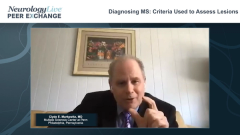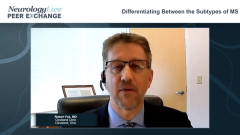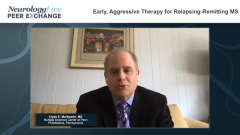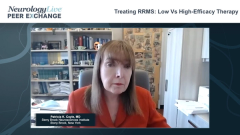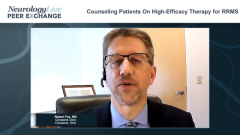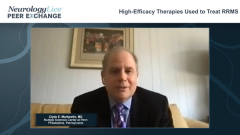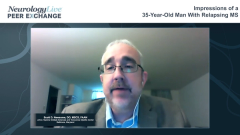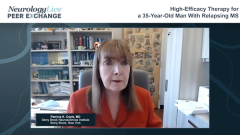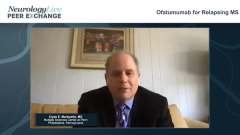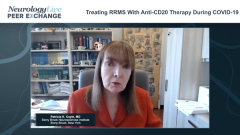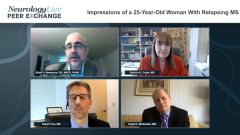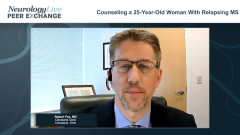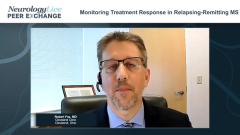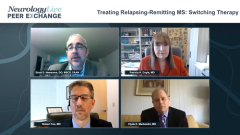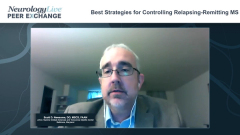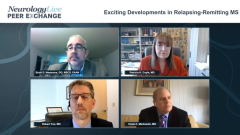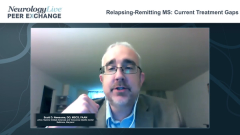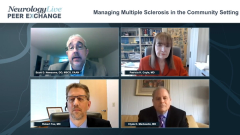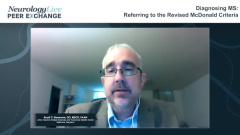
Counseling a 25-Year-Old Woman With Relapsing MS
Factors that impact treatment selection for a 25-year-old woman who presents with relapsing multiple sclerosis, including the patient’s interest in becoming pregnant.
Episodes in this series

Scott D. Newsome, DO, MSCS, FAAN: What about you, Bob and Pat? I know the answer to this question, but is this someone you would consider not starting therapy? What if she says she wants to get pregnant or pursue pregnancy within the next 3 to 6 months? We’ve all had this scenario come up.
Patricia K. Coyle, MD: I would probably counsel her that we should control her MS [multiple sclerosis] before she thinks about pregnancy. I would discourage her from that choice. There are some data to back that up. She definitely has MS. She has had a breakthrough relapse. The going concept is that it’s a luck of the draw that it happened to be an eloquent area. That may not be the case, and there are some data suggesting that this may not be the case. Once MS has clinically presented, maybe something has changed a bit, so I’d recommend that we treat her for a year or 2 and then talk about approaching the pregnancy. My concept for treating her is that she has relapsing MS. That can involve microscopic damage that is hard to detect, and we cannot tell who is going to have mild disease. That’s a retrospective diagnosis looking back 30 years. I don’t think that’s a good bet to take.
What I would do is speak to her and determine what a satisfactory disease-modifying therapy would be using shared decision-making. We do not have to go with a high-efficacy therapy in this individual. What does she feel comfortable with? There’s some use of glatiramer acetate as an injectable because it’s the only agent you don’t need to do any monitoring for: no bloodwork, nothing. This also has a great pregnancy rating, so that still has some desirability for certain patients.
Scott D. Newsome, DO, MSCS, FAAN: Bob, let’s say you do an MRI scan on this individual because I just mentioned the brain and orbit MRI. You do a spinal MRI and see lesions. Does that sway your decision-making in terms of whether you’re going to push the person to a high-efficacy therapy?
Robert Fox, MD: It does not. Let me just take a step back. In a 25-year-old male or female patient with optic neuritis, the clinical syndrome, the enhancing lesion on the optic nerve with a second enhancing lesion in the brain, and a third typical-looking MS lesion, I would not do a lumbar puncture. I don’t think that’s helping. Yes, it came up with oligoclonal bands. If there were no oligoclonal bands, I would treat this patient exactly the same way. It would not change me 1 bit, and this is a patient for whom I feel I have room to start on a moderate-efficacy drug and work-up if needed.
Could she have a devastating transverse myelitis from her MS? It’s always possible. Anything is possible, but the likelihood that she’s going to be significantly impaired over time, during which I can take additional steps to increase the intensity of therapy, is quite low. I’d offer her a couple of different oral therapies. I say a couple to give her different risk profiles and adverse-effect profiles. I’d also offer her glatiramer acetate. Some patients want the absolute lowest-risk therapy, and glatiramer acetate is the lowest-risk therapy. I had a patient who once came into my clinic, the Cleveland Clinic, brand-new. She had been diagnosed by an outside doctor, and she came in and said, “I just got diagnosed. The doctor recommended glatiramer acetate. I don’t think there are enough safety data on that. I don’t want to go on it, so I want your opinion.” Obviously, that patient is extremely risk adverse, so that patient is at the extreme end. At the end of the visit, she was comfortable going on glatiramer acetate because it is the most favorable-risk profile therapy we have. Some patients live there and are most comfortable with the least risky therapy, so I still offer that and a couple of the oral therapies so that they have a choice of the different adverse-effect and risk profiles. This is not a patient for whom I would consider a highly effective therapy, such as 1 of the monoclonal antibodies.
Scott D. Newsome, DO, MSCS, FAAN: There’s more to learn. Clearly, there’s a difference of opinions, and you have to look at a lot of factors, including pregnancy, which is why I’m glad this was brought up. For me, that influences some of the decision-making or some of the recommendations.
Thank you for watching this Neurology Live® Peer Exchange. If you enjoyed the content, and I hope you did, please subscribe to our e-newsletters to receive upcoming Peer Exchanges and other great content right in your in-box.
Transcript Edited for Clarity
Newsletter
Keep your finger on the pulse of neurology—subscribe to NeurologyLive for expert interviews, new data, and breakthrough treatment updates.

